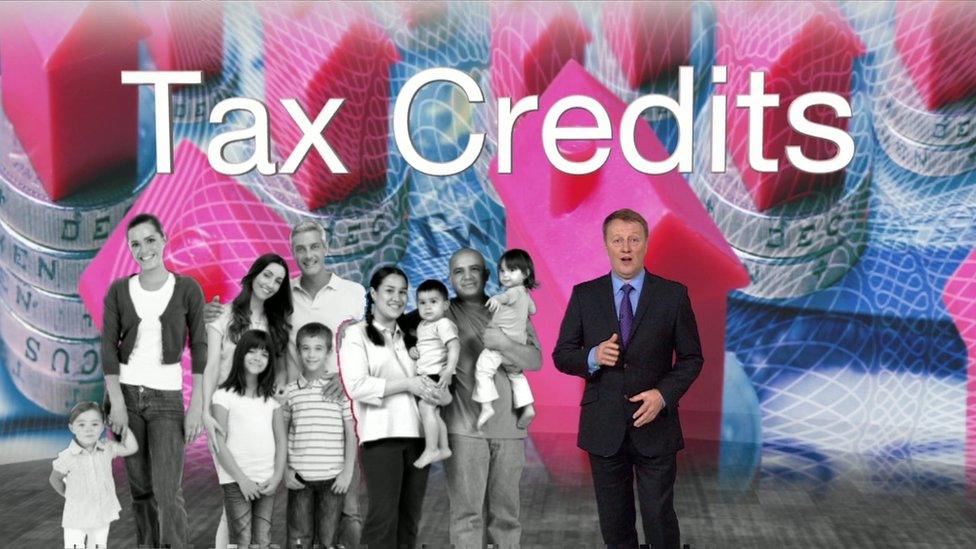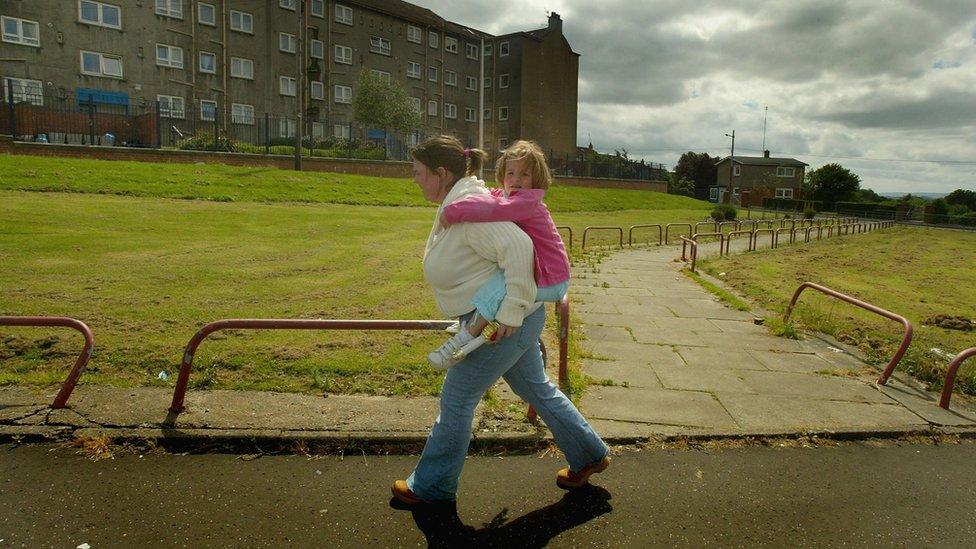Tax credits: No return to 'uncontrolled' spending says Osborne
- Published
The BBC's Economic Editor Robert Peston interviews Chancellor George Osborne after the government's defeat in the House of Lords over tax credits
Chancellor George Osborne has vowed to bring tax credit spending "under control" despite the government's defeats in the House of Lords.
He told the BBC "uncontrolled" welfare spending, including on tax credits, was a threat to the UK's economic security.
While offering to help those set to lose out, Mr Osborne said he would not "lose sight" of his long-term goal of a "low-welfare, high-wage economy".
Peers voted to delay the £4.4bn cuts and compensate losers in full.
Conservative MPs, meanwhile, have continued to express their anger at the House of Lords, accusing it of over-stepping the mark in blocking measures backed by elected MPs.
Downing Street has signalled a review of Lords conventions to address what it says are "constitutional issues".
Speaking to the BBC's economics editor Robert Peston, Mr Osborne said he would listen to people's concerns and announce any modifications in next month's Autumn Statement but insisted he would press on with changes designed to save billions from welfare, claiming they had public support.
"If we have uncontrolled welfare bills, uncontrolled tax credit bills and the like, there will be no security for working families," he said.
"Of course we help in the transition but let's not lose sight of the destination - which is the low-welfare, high-wage economy and the economic security it will provide to working families," he said.
Earlier, speaking at Treasury questions, he said: "We will continue to reform tax credits and save the money needed so that Britain lives within its means, while at the same time lessening the impact on families during the transition."
Low-paid families
Mr Osborne needs to find up to £4.4bn to cover the cost of the climbdown.
Tax credits were introduced by the last Labour government to help low-paid families. Under the government's plans, the income threshold for receiving Working Tax Credits and Child Tax Credit was due to be cut from April.
Critics say the move could deprive low-income workers of up to £1,300 a year.
Downing Street said the letters informing people affected by the cuts may not now go out before Christmas, as originally planned, adding "reform needs to be in place before letters go out".

But the government says it is essential to tackle the deficit and argues most claimants will be better off when other changes, such as the introduction of the new national living wage, are taken into account.
Shadow Chancellor John McDonnell said Labour would support Mr Osborne if he reversed the cuts to tax credits fairly and in full," in a way that did not land a single child in poverty.
'Conservatives split'
He suggested cracking down on corporate tax avoidance and ending "tax cuts to the wealthiest few," such as inheritance tax, to pay for it.
Mr Osborne said he would look at any proposals but not if it meant Labour was "promoting uncapped welfare and uncapped borrowing".
Johnson: House of Lords is pushing its luck
Tuesday night's defeat has exposed a split at the top of the Conservative Party, a senior Tory source told BBC News, with Mr Osborne accused of refusing to listen to MPs' concerns.
"Since they won a majority, the leadership think they're God's gift to politics and think that anything they think or do must be correct by the very dint of them thinking or saying it.
"They will not be moved, despite pressure and warnings - tax credits are just the biggest example of folk seeing an issue coming down the road and them refusing to acknowledge it could do some damage," said the senior figure, who was among those pushing for a rethink on tax credits.
During a dramatic Tuesday evening in the House of Lords, peers voted by a majority of 17 to back Labour calls for the government to provide full financial redress to the millions of tax credit claimants who will be affected when their entitlements are reduced.
Peers inflicted a second defeat by backing a delay in the cuts until an assessment of their financial impact is carried out.

Analysis by the BBC's political editor Laura Kuenssberg
Last night a slightly - and unusually - shaky-looking George Osborne said the Lords had behaved in an unconstitutional way and would be "dealt with".
There is an unresolved question about how far the Lords should stray into the government's finances. It's very clear ministers want to put the problem at peers' door, not their own.
On Tuesday, No 10 will announce some kind of review.
But the real problem is how on earth ministers, and particularly George Osborne, pull themselves out of a hole they have dug with their own hands.

However, they stopped short of blocking the changes entirely, by rejecting a so-called "fatal motion" tabled by the Liberal Democrats.
Mr Osborne responded by hinting at changes to the original proposals, which have been approved three times by MPs, in next month's Autumn Statement.

What are tax credits?
How do tax credits work and how much can people get?
Tax credits have nothing to do with tax. They are benefit payments for parents, disabled people and people on low incomes.
They were introduced by Gordon Brown to lift families out of poverty but the current government believes they are too expensive and are effectively a subsidy for firms that won't pay a living wage.
There are two types - Working Tax Credits (WTC) and Child Tax Credits (CTC), which people with children can claim if they are not working. It is possible to claim both at the same time, with the overall amount worked out using a complicated formula.
Chancellor George Osborne wanted to cut the amount someone could earn before they started losing WTC payments from £6,420 to £3,850, and from £16,105 to £12,125 for those on CTC only.
The rate at which the payments are cut would also have been speeded up. Currently, for every £1 claimants earn above the earnings threshold, they lose 41p. But from April, it would have been 48p.
Tax credits are due to be replaced by a new benefit, Universal Credit.
Read more:

Heidi Allen, one of several Conservative MPs to express reservations about the policy, backed the pause saying it was "right that we delay changes to tax credits until we fully understand the impact".
David Davis, another Conservative opponent, told BBC Radio 4's Today programme "someone had to tell the government to think again".
But other Tories called for the Lords to face "consequences", claiming the unelected chamber had over-reached itself and flouted longstanding conventions giving the elected Commons the exclusive power to determine matters of taxation and government expenditure.
"Not for 100 years has the House of Lords defied this elected House," Sir Edward Leigh said.
"This is a serious matter and I ask for the Commons Speaker to give a statement to protect the rights of the elected representatives, not just for us but for the people of this country."
Downing Street said a review of the constitutional implications would begin straight away, arguing that a "convention exists and it has been broken". Mr Osborne told MPs the government would "deal with" the constitutional issue.

Do you receive tax credits? Will you be affected by any of the issues raised in this story? You can share your comments and experience by emailing haveyoursay@bbc.co.uk, external.
Please include a contact number if you are willing to speak to a BBC journalist. You can also contact us in the following ways:
WhatsApp: +44 7525 900971
Tweet: @BBC_HaveYourSay, external
Send an SMS or MMS to 61124
- Published26 October 2015
- Published26 October 2015

- Published24 November 2015
